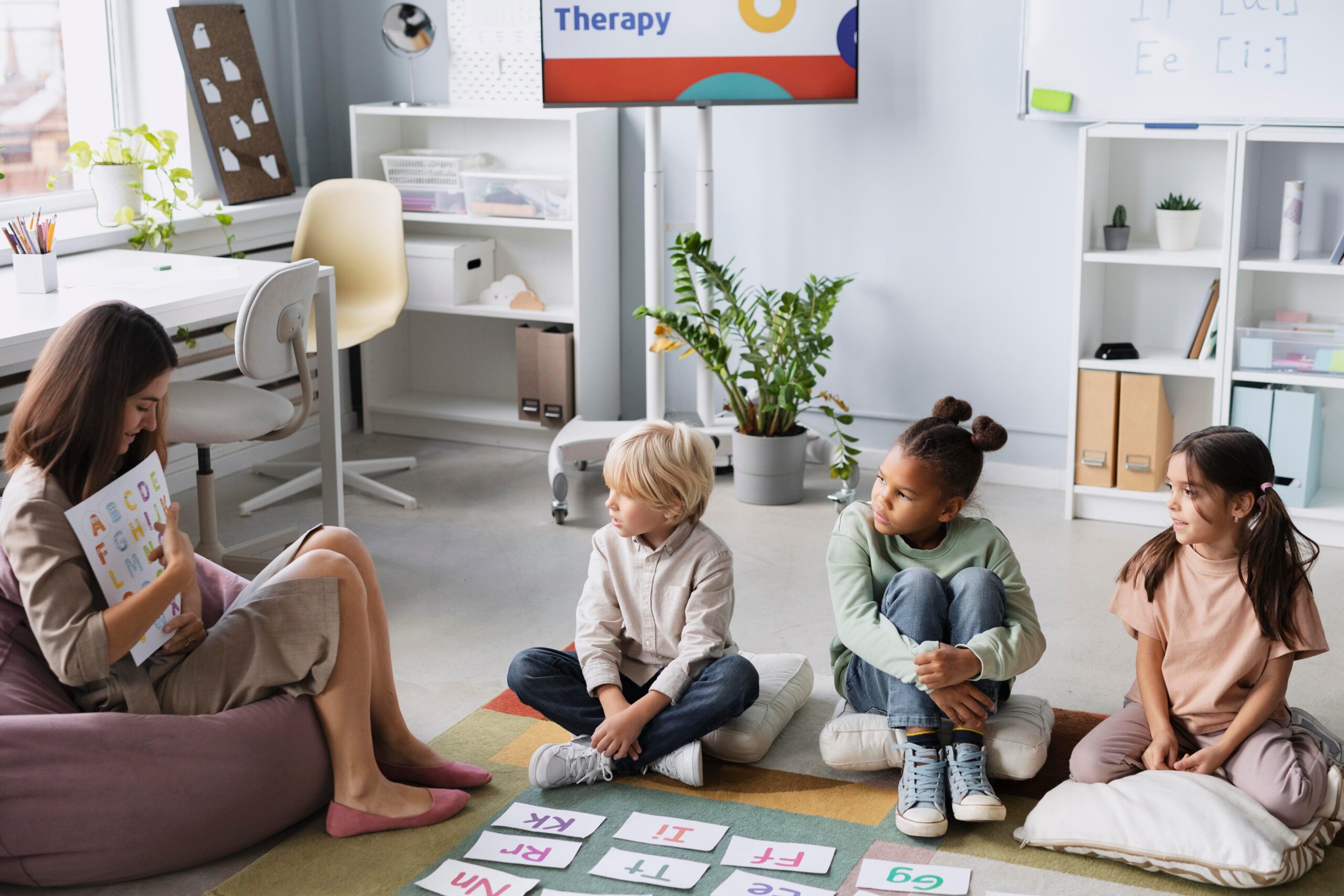 Key Points:
Key Points:
- In-home ABA therapy offers personalized, flexible, and family-involved treatment in a child’s natural environment.
- School-based ABA therapy supports educational and social goals within a structured group setting but may offer less individualized care.
- Choosing between the two depends on your child’s needs, daily routine, developmental goals, and family circumstances.
When your child is diagnosed with autism, you’re faced with a whirlwind of decisions, one of the most important being where and how they’ll receive support. Among the many therapies available, Applied Behavior Analysis or ABA therapy stands out as a widely used and evidence-backed approach for autism intervention. But once you’ve committed to ABA, another question quickly follows:
Should my child receive ABA therapy at home or in school?
This choice can feel overwhelming. You want what’s best for your child, not just in terms of progress, but in how therapy fits into your family’s life. Each setting has distinct benefits, challenges, and outcomes, and this article is here to help you weigh them thoughtfully.
 What Is ABA Therapy?
What Is ABA Therapy?
Before diving into the pros and cons of each setting, it’s helpful to understand what ABA therapy actually involves.
ABA therapy focuses on improving specific behaviors, such as communication, social skills, self-care, and learning. It uses positive reinforcement and data-driven techniques to help children with autism build functional skills that can carry over into all areas of life.
The principles of ABA remain the same whether the therapy takes place in your home, in a school setting, or somewhere else entirely. What differs is the environment, and that can make a big impact.
In-Home ABA Therapy: A Personalized, Family-Focused Approach
In-home ABA therapy takes place in the comfort of your child’s home, often with a behavior technician visiting several times a week under the supervision of a Board Certified Behavior Analyst (BCBA).
Benefits of In-Home ABA Therapy
- Tailored to Your Child’s Environment
One of the strongest advantages of in-home ABA is the ability to work directly in the space where your child lives, eats, sleeps, and plays. This allows the therapist to target behaviors in real-world contexts, like teaching toileting in your bathroom or practicing mealtime behavior at your family table. - Family Involvement
Parents and siblings often play an active role in home-based therapy. You can observe sessions, ask questions, and learn strategies to reinforce skills throughout the day. This turns therapy into a family-centered care model and helps maintain consistency outside of formal sessions. - Flexible Scheduling
In-home therapy can usually be scheduled around your family’s routine, making it easier to accommodate school hours, naps, meals, or other therapies. - Reduced Transitions and Sensory Overload
Children with autism often struggle with change and sensory input. Being in a familiar setting can reduce anxiety and promote better engagement during sessions.
Potential Drawbacks of In-Home ABA Therapy
- Limited Social Opportunities
Because therapy is one-on-one and takes place at home, your child may miss out on peer interaction unless other social opportunities are arranged separately. - Possible Distractions
Homes can be full of distractions like the child’s siblings, pets, and electronics that may interrupt sessions unless managed carefully.
Space and Privacy Concerns
Not all families have the space or comfort level to accommodate therapy staff regularly in their home.
In-School ABA Therapy: Structure, Socialization, and Academic Alignment
School-based ABA therapy typically happens during the school day, either as part of a special education program or integrated into the classroom. It may be provided by school staff or external therapists contracted by the district.
Benefits of School-Based ABA Therapy
- Built-In Socialization
Being in a classroom gives your child regular opportunities to interact with peers, practice group learning, and work on social behaviors in a natural group setting. - Alignment With Academic Goals
In-school ABA can be aligned with your child’s IEP (Individualized Education Plan), helping them meet academic, behavioral, and developmental benchmarks simultaneously. - Structured Routine
For some children, the structure of a school day supports learning and behavior management. Regular transitions, visual schedules, and consistent expectations can promote focus and engagement. - Cost and Accessibility
If your child qualifies, school-based services may be provided at no extra cost through public education programs. This can reduce the financial burden compared to private therapy.
Potential Drawbacks of School-Based ABA Therapy
- Less Individualization
Therapy in school may follow a more generalized plan due to classroom demands, and therapists may not have the same level of time or focus to personalize strategies. - Limited Family Involvement
You likely won’t be able to observe sessions or speak directly with the therapist as often, making communication and carryover into the home more difficult. - Time Constraints
Therapy in school settings is usually limited to shorter sessions or shared among multiple students, reducing the overall therapy hours your child receives.
 In-Home vs. In-School ABA Therapy: Key Considerations for Parents
In-Home vs. In-School ABA Therapy: Key Considerations for Parents
There is no one-size-fits-all answer. Here are the most important factors to weigh when deciding between in-home ABA therapy and school-based ABA therapy:
1. Your Child’s Developmental Needs
- Does your child need help with daily living skills (toileting, dressing, eating)? In-home therapy may be more effective.
- Does your child need support with group behavior or classroom readiness? School-based therapy might be the better fit.
2. Family Schedule and Lifestyle
- Are you available to participate in or support home sessions?
- Is it easier for your child to receive therapy during the school day, reducing extra transitions?
3. Access to Services
- Does your school provide high-quality, consistent ABA services?
- Are there in-home providers available in your area with flexible hours?
4. Social Interaction Opportunities
- If your child is isolated at home, school-based therapy could offer essential social development.
- If social interactions at school are overwhelming, a quieter home setting may allow for more productive learning.
5. Therapy Intensity
- Children often need long hours of ABA therapy weekly, depending on the recommendation of their BCBA. Will the school be able to provide enough hours? If not, in-home services may be needed to supplement.
Hybrid Models: Can You Do Both?
Many families choose a hybrid approach, which means they’re receiving ABA therapy in school and at home. For example, your child might work on academic behaviors and peer interaction during the school day, then focus on daily routines, self-help, or emotional regulation at home.
This dual setting can provide a more holistic approach to treatment. However, it requires strong coordination between home providers, school staff, and families to ensure consistency and avoid overlapping or conflicting strategies.
Take the Next Step Toward Meaningful Progress
Every child with autism is unique. What works wonderfully for one family might not suit another. The decision between in-home and in-school ABA therapy should be grounded in your child’s goals, your family’s availability, and the quality of services offered in each setting.
Explore ABA Therapy in Nebraska, Iowa, and Colorado with Spirit ABA
If you’re ready to begin or expand your child’s autism intervention journey, Spirit ABA offers in-home ABA therapy tailored to your child’s unique needs. Our experienced team collaborates closely with families to create practical, flexible, and compassionate treatment plans designed for real-life success.
Whether you’re looking to supplement school-based ABA therapy or prefer a more personalized in-home approach, Spirit ABA is here to support you every step of the way.
Let’s talk about how ABA therapy in Nebraska, Iowa, or Colorado can make a difference for your child. Contact us today to schedule a consultation and learn more about how we can help bring consistency, growth, and confidence into your child’s world.


